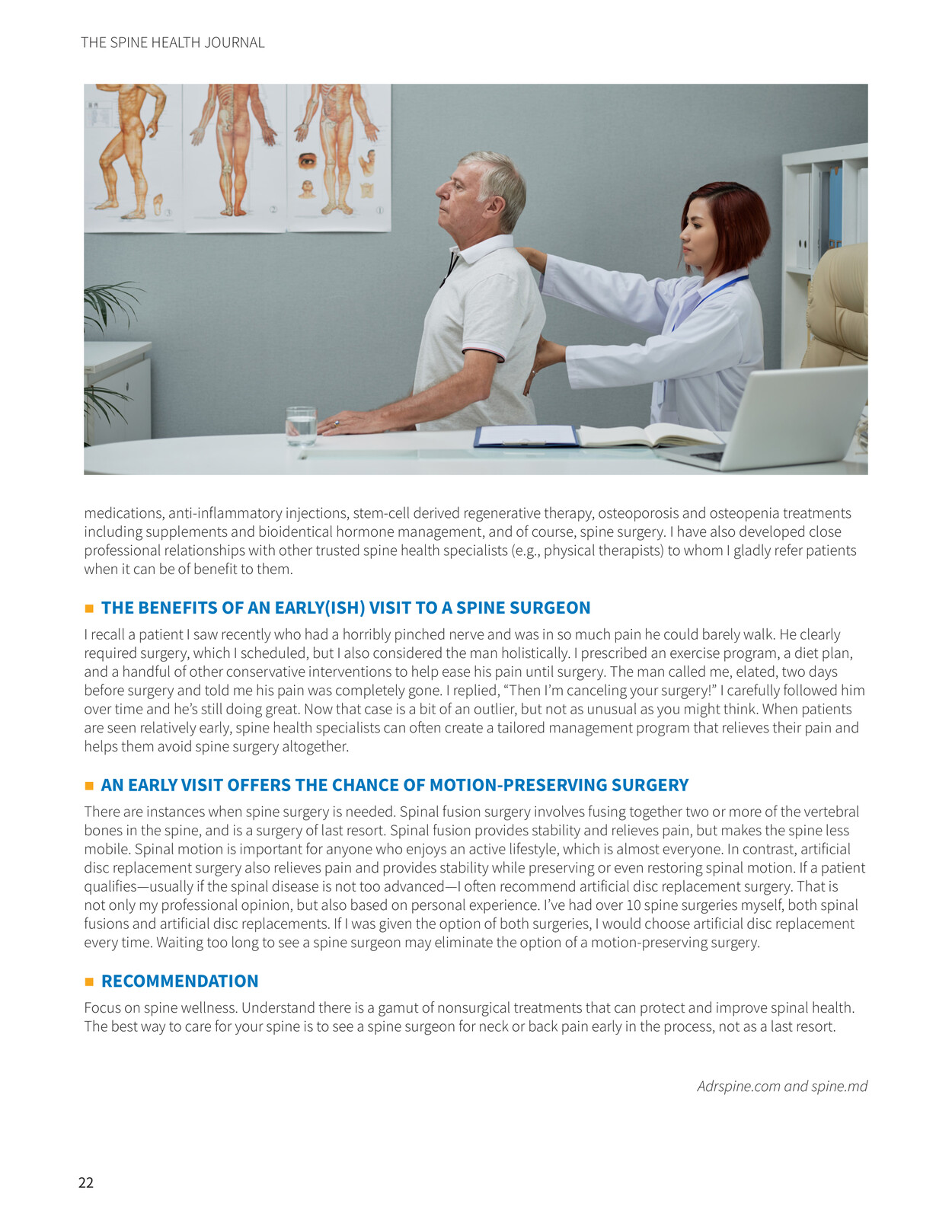
The Waiting Game
In my experience as a practicing spine surgeon, very often patients come to me for the first time after many months or even years of neck or back pain. When this happens, I think to myself, “Why didn’t you come to me sooner?” The longer that some spinal conditions go untreated, the worse they get. Over time, patients run out of treatment options for neck or back pain until I can only offer them spinal fusion, a true last resort. Waiting can often be detrimental to recovery and consulting with a spine surgeon doesn’t have to be as scary as you might think.
Spine Surgery Is the Last Resort, but Seeing a Spine Specialist Should Be One of the First
In the majority of cases, spine surgery is only indicated after patients have suffered with symptoms for several months to years and conservative treatments have failed. It is understandable that patients with short term symptoms may ask, “Why would I see a spine surgeon now if I am not yet a candidate for spine surgery?” However, the spine wellness practice I have built over the past several decades (and other practices like it) is dedicated to all forms of spine health and wellness. I am a spine surgeon, but I am also a spine health specialist. Spine health involves nutrition, exercise, weight management, physical therapy, metabolic and hormonal management, injections, and spine surgery. Perhaps surprisingly, most of the patients I see in my practice ultimately do not require spine surgery; they find relief with other spine health treatments. The earlier a spine health specialist is involved, the better chance at improving overall spine health and reducing symptoms.
Some Spine Surgeons Practice Holistic Spine Health Management
It is certainly true that most patients with neck or low back pain should see their primary care physician first. According to some estimates, four out of five patients with neck or low back pain will get better solely with simple treatments like NSAIDs or muscle relaxants and some modest exercise, making a trip to the spine surgeon unnecessary. However, if your neck or low back pain does not resolve within a few weeks, consider seeing a spine surgeon who practices holistic spine care. A holistic approach to spine care is one in which a person’s age, lifestyle, nutrition, hormone status, exercise routine, overall physical health, and spine health are considered together to develop a customized, comprehensive therapeutic plan. In my practice, for example, I provide diet and exercise advice including weight loss medications, anti-inflammatory injections, stem-cell derived regenerative therapy, osteoporosis and osteopenia treatments including supplements and bioidentical hormone management, and of course, spine surgery. I have also developed close professional relationships with other trusted spine health specialists (e.g., physical therapists) to whom I gladly refer patients when it can be of benefit to them.
The Benefits of an Early(ish) Visit to a Spine Surgeon
I recall a patient I saw recently who had a horribly pinched nerve and was in so much pain he could barely walk. He clearly required surgery, which I scheduled, but I also considered the man holistically. I prescribed an exercise program, a diet plan, and a handful of other conservative interventions to help ease his pain until surgery. The man called me, elated, two days before surgery and told me his pain was completely gone. I replied, “Then I’m canceling your surgery!” I carefully followed him over time and he’s still doing great. Now that case is a bit of an outlier, but not as unusual as you might think. When patients are seen relatively early, spine health specialists can often create a tailored management program that relieves their pain and helps them avoid spine surgery altogether.

An Early Visit Offers the Chance of Motion-Preserving Surgery
There are instances when spine surgery is needed. Spinal fusion surgery involves fusing together two or more of the vertebral bones in the spine, and is a surgery of last resort. Spinal fusion provides stability and relieves pain, but makes the spine less mobile. Spinal motion is important for anyone who enjoys an active lifestyle, which is almost everyone. In contrast, artificial disc replacement surgery also relieves pain and provides stability while preserving or even restoring spinal motion. If a patient qualifies-usually if the spinal disease is not too advanced- often recommend artificial disc replacement surgery. That is not only my professional opinion, but also based on personal experience. I’ve had over 10 spine surgeries myself, both spinal fusions and artificial disc replacements. If I was given the option of both surgeries, I would choose artificial disc replacement every time. Waiting too long to see a spine surgeon may eliminate the option of a motion-preserving surgery.
Recommendation
Focus on spine wellness. Understand there is a gamut of nonsurgical treatments that can protect and improve spinal health. The best way to care for your spine is to see a spine surgeon for neck or back pain early in the process, not as a last resort.







